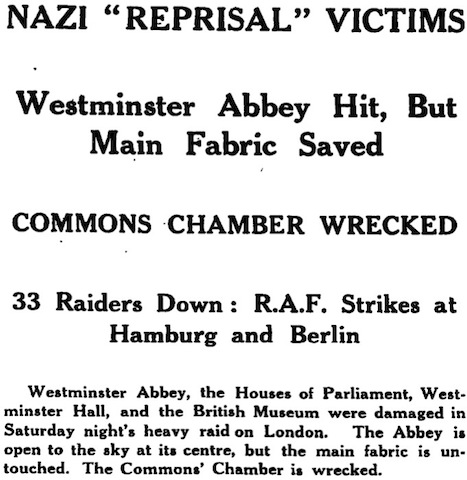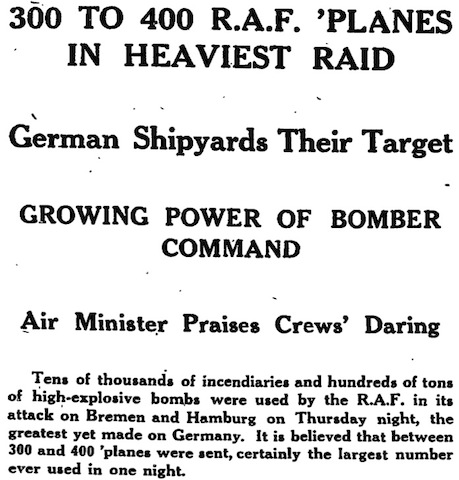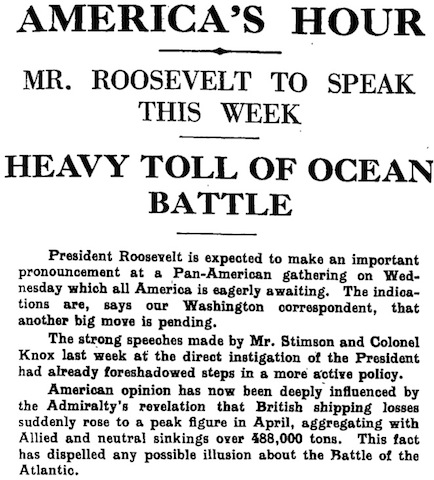
There is a lot going on in the Mediterranean and African theatres at the moment. The big news, as reported here by The Times, is that Italian forces in northern Abyssinia have asked for surrender terms (4). They, along with the Duke of Aosta, Viceroy of Abyssinia, are holed up in ‘the mountain stronghold of Amba Alagi‘, where they are being battered by Indian and South African troops. According to the delayed dispatch of The Times‘s correspondent, Italian morale was very low nearly a week ago, and must be on the verge on breaking by now:
It is a strange twist of fortune that has made the caves where Haile Selassie once sheltered the refuge of the Duke of Aosta’s Army. Its disintegration goes on constantly. Deserters at night time steal their own lorries to make a getaway. Many reach the security of our lines. Some are not so lucky.
Once Amba Alagi falls, there will be only two remaining centres of Italian resistance left in Abyssinia.
From the Libyan frontier, a ‘local offensive’ by British forces has driven back Axis forces overlooking Sollum, captured 550 prisoners, and forced ‘von Rommel, the German G.O.C., Libya’ to use some of his reserves, ‘thus upsetting his plans for future operations’. A ‘crack British battalion, preceded by tanks and Bren-gun carriers‘ took the strategic Halfaya Pass in a dawn attack; later another combined-arms attack captured Fort Capuzzo. ‘Here, however, trouble began’:
The Germans adopted the device, used frequently in France, of allowing [our] tanks to pass through their machine-gun positions lying concealed in shelters. When the tanks signalled to our infantry to advance the latter were met unexpectedly by a hail of machine-gun fire, and at the same time our tanks were engaged by anti-tank guns of a heavy type, firing six-pounder armour-piercing shells.
Another infantry attack encountered ‘an unexpectedly large force of enemy tanks’. Overnight it was decided to withdraw from the Fort Capuzzo area. Still, Halfaya (or ‘Hell Fire’) Pass is still held; and an Australian sally from besieged Tobruk recaptured about 300 yards of enemy lines, so that’s also good news.
In the air, RAF bombers have attacked Benghazi and aerodromes in Greece. An enemy raid on the Suez Canal on Saturday night resulted in ‘no damage or casualties […] to Service property or personnel’ (Manchester Guardian, 5). Luftwaffe raiders were successfully intercepted over Crete, and near Baghdad, ‘Two of our Gladiator fighters encountered two Me. 110’s […] and destroyed both without suffering any damage to themselves’. Things are quieter in skies closer to home (though perhaps not if you lived in Cologne, which received its second RAF air raid in succession on Saturday night), with enemy air activity over Britain described by the Air Ministry and Ministry of Home Security as being on a ‘very small scale’ (5). This may not bode well for Noel Pemberton Billing, ‘a “Bomb Berlin” candidate in the last war [who] says he will contest the Hornsey by-election as an Independent “win the war in the air” candidate’ (6).
Mr. Pemberton Billing, an air pioneer, failed to secure election to Parliament for Mile End in January, 1916, but two months later, after five Zeppelin raids, was returned for East Herts.
Nominations close tomorrow.
There is an interesting article by an aeronautical correspondent on air defence in the Guardian today (4). It cautions against too much optimism over the recent successes in night interception:
All the heavy bomber successes which have so far been achieved without loss have come during periods when the fighters were unable to make contact with the bombing machines. The bombers were either using the dark as cover or else were using clouds. At no time in the present war has the big bomber shown itself capable of piercing fighter screens. It must be able to evade the fighters or else it will be shot down in large numbers.
This is most obviously true in daylight — ‘We dare not send over large bombing aeroplanes by day’ — but even at night, large size ‘is a serious drawback when the visibility is sufficiently good to allow the defending fighters to make contact’. And it is on clear, moonlit nights that British air defences have claimed most of their victims.
From these brief and somewhat sketchy comments upon the existing position it will be appreciated that the air war at night has reached now a stage where the degree of success obtained by night fighter interceptor fighters must determine who will gain the upper hand. Should the Germans manage to get ahead of us in the process of night interception they would be able to check our counter-bombing attack on targets in Germany while maintaining their own attacks on our cities at about the same intensity.
The ‘crucial test’ will come on dark nights. And
It is when the detection and interception of aircraft depend not upon the directions from the operations-room and finally the eye-sight of the pilots but when they depend upon the use of special instruments that the test comes.
Both Britain and Germany have been working on these ‘special instruments’. ‘It is a race between highly complex and scientific methods of detection and interception in the dark […] and so far it must be confessed that there is no positive evidence that we are winning it’.
An article on the conditions of enemy aliens in internment camps notes that, while there are still cases of, for example, ‘Nazis and anti-Nazis being kept together in the women’s camps in the Isle of Man‘, there is ‘general satisfaction now’ (3) with the way the Home Office is handling the matter. (Except for unnamed ‘irresponsible journalists’ who claimed that the government is ‘”coddling” internees’). The same cannot be said of enemy aliens in the Dominions, it seems:
Conditions in Canada and Australia are far worse than they are here. It seems from letters to England that all internees in Canada, even though in the entirely Jewish camps, are treated as prisoners of war and all those in Australia as convicted criminals.
Perhaps somebody should remind the Australian authorities that transportation ended in 1868.
![]() This work is licensed under a Creative Commons Attribution-NonCommercial-NoDerivatives 4.0 International License.
Permissions beyond the scope of this license may be available at http://airminded.org/copyright/.
This work is licensed under a Creative Commons Attribution-NonCommercial-NoDerivatives 4.0 International License.
Permissions beyond the scope of this license may be available at http://airminded.org/copyright/.






Pingback: Airminded · Tuesday, 20 May 1941